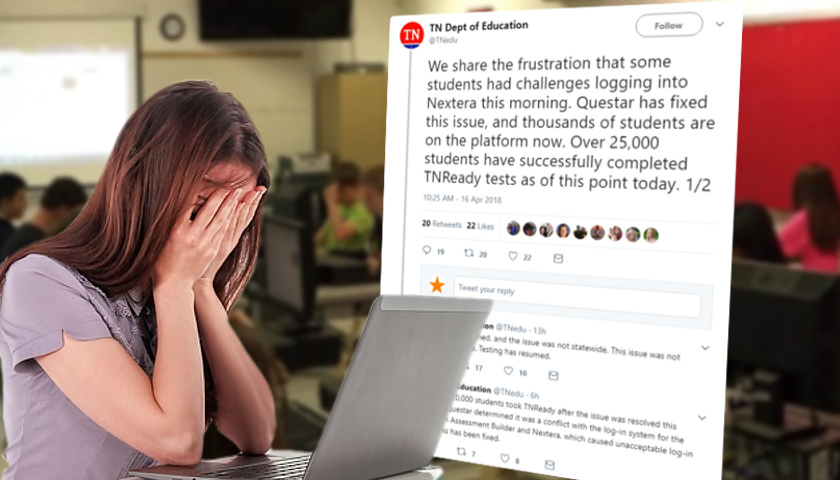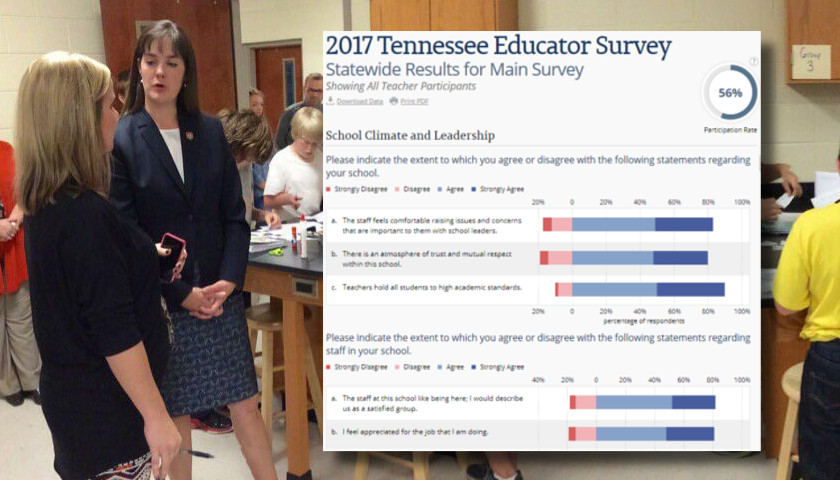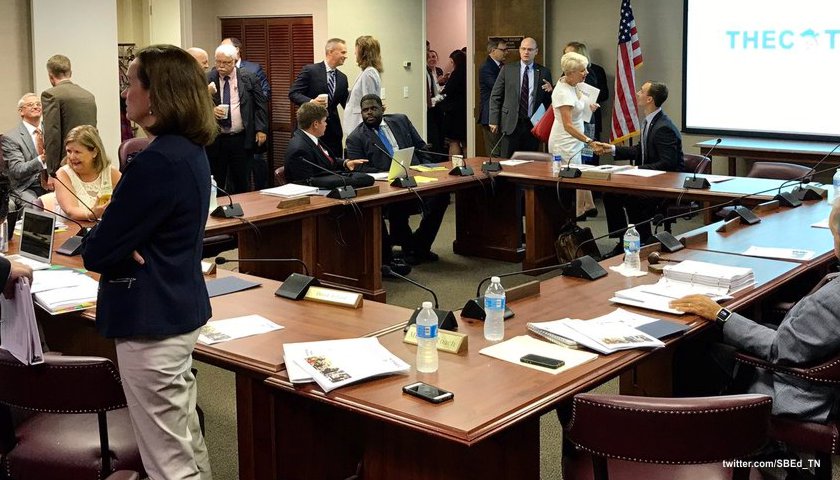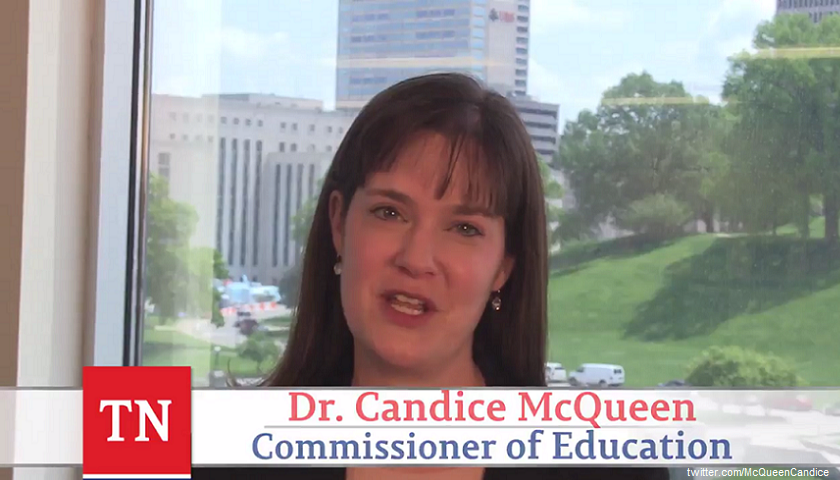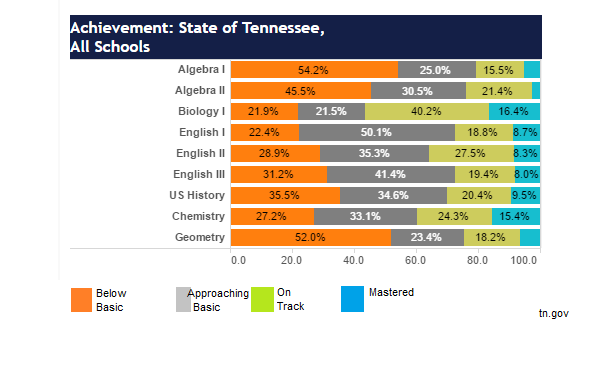Students attending K-12 public schools in Tennessee are struggling to perform above average on national standardized tests. Partially adopted in 2010 and fully implemented by the 2013-14 school year, Common Core State Standards (CCSS) failed to produce the academic results expected. The Tennessee Department of Education and Governor Bill Haslam “rebranded” CCSS as Tennessee standards after the legislature passed a bill to repeal the Core in April 2015. “Common Core is as big a change in education as Obamacare is in health care, but unlike Obamacare it needed no votes in Congress to become national policy,” Joy Pullman, executive editor of The Federalist, wrote in her 2017 book, The Education Invasion: How Common Core Fights Parents for Control of American Kids. These controversial K-12 public education standards, “garnered practically no notice from the media before the Obama administration, in concert with largely unelected state bureaucrats and a shadow bureaucracy of private organizations, locked it in nationwide. That meant no public debate before the scheme was imposed upon a country supposedly run with the consent of the governed,” Pullman observed. Common Core State Standards were adopted in full or in part by the governments of 46 states beginning in 2009, the first…
Read the full storyTag: Tennessee Department of Education
Ruth, a Local Teacher, Calls in to The Tennessee Star Report and Explains the Difference Between a Lesson Plan and a Calendar
On Friday’s Tennessee Star Report with Steve Gill and Michael Patrick Leahy – broadcast on Nashville’s Talk Radio 98.3 and 1510 WLAC weekdays from 5:00 am to 8:00 am – the team discussed how Williamson County Schools failed to follow Tennessee State law by submitting a calendar for the academic year instead of the legally required in-service plan to the Tennessee Department of Education for approval of the controversial “white privilege” in-service training delivered to the system’s teachers this year. A local teacher named Ruth called in and explained the difference between a lesson plan and a school calendar and also offered some detailed information on the topic: Gill: Let’s go to Ruth. Ruth wanted to talk a little bit about the distinction between a plan and what the state of Tennessee and Williamson county and others are doing in terms of their in-service training calendar. Ruth welcome to the Tennessee Star Report. Ruth: Good morning. Hi. I am a teacher and anybody in education knows that there is a massive difference between a school calendar and a plan. As teachers, we’re required to have lesson plans. And I can’t just write down I’m going to teach math today. I have to…
Read the full storyMark Levin’s TV Program Spends Full Half Hour on ‘White Privilege’ Videos from Williamson County Schools Obtained by The Tennessee Star
On Wednesday’s Tennessee Star Report with Steve Gill and Michael Patrick Leahy – broadcast on Nashville’s Talk Radio 98.3 and 1510 WLAC weekdays from 5:00 am to 8:00 am – Gill and Leahy held a special discussion after Mark Levin featured the WCS boards in service training modules on the Mark Levin’s show BlazeTV Tuesday evening. Throughout the segment, Gill and Leahy discussed Mark Levin’s response to the videos and talked about how other counties might be putting this racist and biased agenda into their in-service teacher trainings. The men called for citizens to take control of their schools and to investigate whether or not their schools are taking part in this anti-American agenda. (BlazeTV Show audio plays) Gill: That’s Mark Levin on his show on The Blaze last night literally took an entire segment, thirty minutes of the show and dissected the Williamson County white privilege video as you heard it there. That’s just kind of the initial part where he was breaking it down. He literally went segment by segment tearing it apart as it went. And again in the way that the brilliant Mark Levin can do. He illustrates the idiocy of this whole thing including…
Read the full storyWCS Superintendent Looney and TN Dept. of Education Fail to Produce Evidence ‘White Privilege’ Training Is Legally Authorized
By Tennessee law, the Williamson County School Board is required to approve In-service training plans for teachers. As reported, this year’s In-service training of Williamson County Schools teachers for the academic year 2018-2019 includes a “Cultural Competency” video series that preached “white privilege.” At present, there is no evidence that Superintendent Mike Looney ever prepared the statutorily required In-service training plan, nor is there any evidence the Williamson County School Board ever approved that plan, as is required by law, nor is their any evidence that Superintendent Looney submitted that plan to the Tennessee Department of Education (TDOE) by June 1, 2018, as is required by law, nor is their any evidence that former Commissioner of Education Candace McQueen approved that plan, as is required by law. Superintendent Mike Looney is supposed to file that training plan with the Tennessee Department of Education (TDOE) every June before the start of a new school year, and the plan may not be implemented without the approval of the Commissioner of Education. So, if those plans, and a document containing former Commissioner of Education Candace McQueen’s approval of those plans are on file with the TDOE, then surely members of that department have…
Read the full storyThe Tennessee Star Report’s Gill and Leahy Discuss WCS Superintendent Mike Looney and the ‘Unresponsive’ Williamson County School Board
On Tuesday’s Tennessee Star Report with Steve Gill and Michael Patrick Leahy – broadcast on Nashville’s Talk Radio 98.3 and 1510 WLAC weekdays from 5:00 am to 8:00 am – Gill and Leahy discussed the legal implications of Williamson County schools Superintendent Mike Looney who has allegedly gone rogue and avoiding the law for implementing racist and anti-American un-authorized in-service teacher training modules. Towards the end of the segment, the men discussed the lack of response from the Williamson County school board members and the possible legal ramifications due to evidenced neglect for Tennessee State law. Gill: One of the lead stories at Tennessee Star today, focuses on again this Williamson County video series and it’s not X rated it’s just I rated for idiot. (Leahy laughs) Gill: It’s the I rated Mike Looney video series that promotes the racist idea that ALL WHITE PEOPLE ARE RACIST and it’s WHITE PRIVILEGE if you’re not being successful and you’re not white it’s not your fault. It’s because of all those white people that are keeping you down. And that’s the agenda that Mike Looney and the Williamson County school board have decided needed to be taught as in-service training to teachers.…
Read the full storyWilliamson County School Board Members Dodge Questions About Whether They Gave the OK to ‘White Privilege’ Training
By Tennessee law, members of the Williamson County School Board must adopt the In-Service training for teachers before Superintendent Mike Looney files it with the Tennessee Department of Education. Again, it’s state law. The Tennessee Department of Education’s (TDOE) website says so. Here is exactly what Tennessee Code Annotated Section 49-6-3004, which is displayed verbatim on the TDOE website says: In-service days shall be used according to a plan recommended by the local superintendent of schools in accordance with the provisions of this section and other applicable statutes, and adopted by the local board of education. A copy of this plan shall be filed with the State Commissioner of Education on or before June 1 the preceding school year and approved by him. (emphasis added) So, did the Williamson County School Board approve an In-service teacher training curriculum that preached, among other things, “white privilege” leftist social justice causes, and America’s supposed dysfunctional history? County school board members did not respond to The Tennessee Star’s request for comment, despite having more than two days to do so. Only one school board member, Brad Fiscus, responded to The Star, via email. His response, however brief: “I joined the board in August 2018,”…
Read the full storyWilliamson County Schools Teacher on ‘White Privilege’ Training: ‘They Basically Are Telling White Teachers That We Are Racist. It is Super Offensive.’
A Williamson County Schools teacher who was forced to sit through the Williamson County Schools Competency Training Series video on “white privilege” contacted The Tennessee Star on Wednesday and delivered a searing critique of the in-service training created and mandated by Williamson County Schools superintendent Mike Looney. “Please investigate this as I am a Williamson County school teacher and had to sit through the ‘White Privilege’ training. It was a joke. They basically are telling white teachers that we are racist. It is super offensive,” the teacher, who requested anonymity, told The Star. “We can’t speak up for fear of losing our jobs,” the teacher added. “You have the power to investigate and hold the leaders of Williamson County accountable,” the teacher told The Star. “Teachers can’t, we need our jobs but are being forced to endure such offensive assumptions. I judge/see all students’ character. This is what speaks to any teacher. The idea that because a person is white, they are privileged, is ludicrous and offensive,” the teacher continued. “I am attaching a copy of papers we were given during the training,” the teacher continued. You can see those papers below: [pdf-embedder url=”https://tennesseestar.com/wp-content/uploads/2019/03/scan-1.pdf” title=”scan (1)”] As The Tennessee Star reported this month,…
Read the full storyWilliamson County Schools Spending 22 Percent More on In-Service Training for Teachers This Academic Year
The Williamson County School System is serious about prioritizing its In-Service teacher training, so much so administrators spent 22 percent more on it for this 2018-19 school year versus the prior one. According to the school system’s budget, administrators spent $689,989 on their In-Service/Staff Development training this school year. For the 2017-18 school year, administrators budgeted $564,508. This school year’s budget for the In-Service teacher training is a 57 percent increase over what it got in the 2013-14 school year, $439,847. Other budgeted items, including materials and supplies, got less than a 1 percent budget increase over the previous school year, while workers compensation insurance got a 2 percent increase. Budgeted liability insurance costs remained the same, while the school system’s building and contents insurance got a 17 percent decrease. You can see the budget breakdown for In-Service training expenditures by Williamson County Schools from the 2013-2014 academic year to the 2018-2019 academic year here: As The Tennessee Star reported this week, as part of this In-Service teacher training, Williamson County School System officials made teachers watch a video that tried to instruct them on how to teach students about “white privilege.” The 26-minute in-service training video, the third in…
Read the full storyQuestions Surround Who Approved ‘White Privilege’ Training for Williamson County Teachers
Williamson County officials had the ultimate power to approve an In-service “white privilege” training curriculum for their teachers last month, said a spokeswoman for the Tennessee Department of Education Wednesday. But that’s inconsistent with the TDOE’s standards and practices on In-service teacher training, as specified on that department’s website. Tennessee’s education commissioner, according to the rules, has the final say approving any In-service training plans. Local school system officials submit those plans to the education commissioner months before the start of the new school year. “In-service days shall be used according to a plan recommended by the local superintendent of schools in accordance with the provisions of this section and other applicable statutes, and adopted by the local board of education,” the TDOE website said. “A copy of this plan shall be filed with the State Commissioner of Education on or before June 1 the preceding school year and approved by him.” The Tennessee Star asked TDOE officials Tuesday and Wednesday whether officials from that department had approved Williamson’s “white privilege” In-service training curriculum? TDOE spokeswoman Chandler Hopper, in an emailed statement, said the following: “Tennessee is a state that believes in local authority, so the content of inservice trainings…
Read the full storyJC Bowman Commentary: What I Didn’t Say About the Departure of TN Dept. of Education Commissioner Candice McQueen
Tupac Shakur said, “Behind every sweet smile, there is a bitter sadness that no one can ever see and feel.” I spent time with Commissioner McQueen as more than a casual observer. Her heart and passion were always for the children and teachers in Tennessee. She fought battles which nobody knew about and which, despite the lofty title in front of her name, she had little control.
Read the full storyEducation Policy: 9 Issues to Address in 2019
Public education is not “broken.” Public education policy is “broken,” and neighborhood public schools are suffering the consequences. Here are nine of the most critical and challenging issues in public education we should address in 2019 in Tennessee.
Read the full storyTennessee Might Bow Out of Nationwide Plan to Arm Teachers
Public schools nationwide might use federal money to arm teachers in class, but don’t look for Tennessee to participate. “With very few exceptions, it is unlawful for anyone in Tennessee – educator or otherwise – to possess a firearm on school grounds,” said Sarah Gast, spokeswoman for the Tennessee Department of Education, in an emailed statement to The Tennessee Star. “Two sections of Tennessee law provide a very limited exception.” Officials in what Gast described as distressed rural counties may authorize some school employees to carry concealed weapons, if that district meets certain eligibility requirements. Only two of Tennessee’s 147 school districts meet that criteria — Wayne County Schools and Pickett County Schools, Gast said. “As of last year, neither had chosen to allow employees to carry concealed weapons,” Gast said. “However, they would not be required to notify us if they changed their policy.” Gast did not say how or why those two districts meet the criteria. As part of the second statute, educators would have to meet substantial requirements to carry a firearm and only if district officials allow it, Gast said. “It essentially states that if an educator is also in law enforcement or has prior service…
Read the full storyJC Bowman Commentary: Tone Deaf School Districts
“If you don’t understand — from the school district to the superintendents — that we want our teachers held harmless, then I’m sorry, you’re tone-deaf.” —-State Representative Eddie Smith (Knoxville). That message was heard and understood statewide, right? Apparently not. We are receiving reports from across the state that some districts are denying their teachers their justified and earned bonuses, which harms the educator.
Read the full storyGov. Bill Haslam Says Don’t Throw in the Towel on TNReady
Before he packs up and vacates the Tennessee governor’s mansion early next year, Bill Haslam wants a dialogue with you about ways to improve TNReady. Haslam, at the state capitol Tuesday, announced what he described as a listening tour to do just that. The current governor and a team of handpicked educators will travel to six different cities as part of that tour, he said. The first scheduled stop is Friday, in Knoxville. TNReady, Haslam said, has had several hiccups. “Recently, there has been a lot of criticism of TNReady,” Haslam said. “Much of that criticism was earned. We experienced significant problems with the implantation and delivery, and these are problems that we know are unacceptable.” Haslam said he wants to fix the problems instead of “pointing fingers and casting blame.” “I am committed to doing what I can as governor before I leave to get this right,” Haslam said. “To throw in the towel on assessment is the wrong approach.” As he talked, Haslam was flanked by several people he described as “TNReady Ambassadors” — teachers, assessment coordinators, and other educators from around the state. Among them — Wayne Miller, a former executive director of the Tennessee Organization of…
Read the full storyTennessee Department of Education Under Fire For Administrative Incompetence
Tennessee Star Political Editor Steve Gill was flabbergasted on Monday’s edition of The Gill Report – broadcast on Knoxville’s 92.3 FM WETR – regarding the repeated incompetence displayed at the Tennessee Department of Education. Gill commented, “The Tennessee Department of Education has stepped in it again.” He continued: One of the things the Department of Education has had to set up under state law, it is a requirement of state law. Is a Pre-K and Kindergarten portfolio assessment program. Now apparently the Tennessee Department of Education failed to set up the program appropriately and now they’ve had some computer glitches that have caused them to not have the assessments of teachers done in an appropriate, timely or accurate way. And they’ve apparently randomly assigned one on a scale of five, to some teachers because they couldn’t figure out what to do so they just gave them one’s. Now this is supposedly not going to effect the teachers retention of their job, their pay raises, or anything else. But a lot of teachers aren’t really believing that. Professional Educators of Tennessee has some more details about this whole controversy, you can find out more there. Meanwhile, the Tennessee Teachers Association, the…
Read the full storyJC Bowman: A Few Thoughts on Educational Assessment and Evaluation
The risk of misidentifying and mislabeling teacher performance based on test scores is too high for it to be the major indicator of teacher performance, especially when you look at issues such as student demographic characteristics. A number of states, including Michigan, have since taken steps to lessen the impact test scores have on teacher evaluations, repeatedly mentioning factors outside an educator’s control which can influence a student’s academic performance.
Read the full story2018 TNReady Scores Show Mixed Results
Students improved most in early grades reading, narrowed achievement gaps; show need for deeper, more sustained work to support improvement. Professional Educators of Tennessee added comments and concerns.
Read the full storyTennessee Department of Education Announces Testing Changes
The Tennessee Department of Education announced at a noon press conference on Thursday several changes to the state TNReady test that teachers, administrators and superintendents have been asking the state to make, the Professional Educators said in a statement released on Thursday. “Among the changes include rebidding the testing contract, refining the current Questar contract, revising timeline for online testing, and engaging more teachers. These steps complement additional actions already in the works, including eliminating two TNReady end-of-course exams, eliminating the March stand-alone field test for the next two years, simplifying and streamlining test administration, bringing in a third party to perform an independent review of Questar’s technological capabilities, improving customer service, and engaging dozens of additional Tennessee teachers, content experts, and testing coordinators to look at every part of our state testing program,” the statement said. You can read the rest of the statement here: Dale Lynch from the Tennessee Organization of School Superintendents and JC Bowman from Professional Educators of Tennessee were in attendance at the announcement. Both praised the Tennessee Department of Education for taking proactive steps to address the issue. Bowman added: “Leadership collects input from those on the ground, makes the process better for all, and then…
Read the full storyJC Bowman Commentary: TNReady Legislation and Accountability
“If you don’t understand — from the school district to the superintendents — that we want our teachers held harmless, then I’m sorry, you’re tone-deaf,” said State Representative Eddie Smith.
Read the full storyProblems Reported on First Day of TNReady Testing
After months of preparing for the annual year-end assessments, many Tennessee students struggled to log on to the TNReady testing platform Monday morning. The Department of Education says the problem was quickly fixed by the vendor, and over 20,000 students took the test after the problems were resolved. “We share the frustration that some students had challenges logging into Nextera this morning. Questar has fixed this issue, and thousands of students are on the platform now. Over 25,000 students have successfully completed TNReady tests as of this point today,” the Department of Education tweeted. “No server has crashed, and the issue was not statewide. This issue was not related to volume. Testing has resumed.” Some districts saw the early errors as a warning of what was to come and chose to cancel testing for the day. “In Williamson, most of our 5-11 students could not log in,” said Jason Golden, Deputy Superintendent of Williamson County Schools. “Williamson County Schools early reports indicate that those who did get logged in apparently finished the test, but we can’t measure the distractions they were dealing with in each classroom as other students couldn’t get logged in. We shut it down for the day & are…
Read the full storyFurther Testing Issues Show Implementation Problems at Tennessee’s Department of Education
After three years and little success, the Tennessee Department of Education remains riddled with problems implementing statewide online testing platforms, TNReady. According to an email blast from Chief Information Officer for the Tennessee Department of Education Cliff Lloyd on March 6, the state’s online testing platform experienced more technical difficulties this week. “The problem was related to a rogue process that was running in the data center where NextEra is hosted,” Lloyd said. “The problem was identified relatively quickly and the process was shut down, but unfortunately it did negatively impact about fifteen districts.” The email blast was sent to educators across the state as they tried to log into their state-mandated testing platform, but it wasn’t these teachers’ first report of problems from the department; in fact, it wasn’t even their first update this week. “Yesterday I wrote to you and explained the diagnosis and remediation of a problem in the NextEra testing platform that made logging on to the system difficult,” Lloyd wrote earlier in the email. “While that problem is now solved, unfortunately we encountered another problem today.” From the original vendor failing to create a functioning testing platform to thousands of tests being incorrectly scored to…
Read the full storyBeth Harwell Calls for State Legislative Hearings on TNReady Testing Problems
House Speaker Beth Harwell (R-Nashville) is calling for state legislative hearings on problems with TNReady scoring. “We have made great strides over the last several years in education, and we must be diligent in ensuring we continue these gains,” Harwell said on Facebook Tuesday. “We know that accountability has been a large part of this improvement. However, the news that nearly 10,000 TNReady tests were scored incorrectly has resulted in educators, parents, and legislators seeking answers. In addition, the amount of testing has also raised questions.” Hawell, who is running for the Republican gubernatorial nomination, has asked the House Government Operations Committee to hold the hearings. The scoring issue is the latest in a string of glitches over the past several years with standardized testing in Tennessee public schools. Testing has also come under scrutiny for the amount of time it takes away from instruction, the way student scores are linked to teacher evaluations and for what is viewed as acquiescence to a national large-scale testing apparatus involving for-profit companies selling testing products and services. At the end of this past school year, testing vendor Questar was slow in returning test scores for report cards. Problems with its scanning program are now…
Read the full storyTennessee Educator Survey Reveals Teacher Frustration With Testing, Flood of New Initiatives
Tennessee teachers surveyed this past spring reported frustration with statewide standardized exams, while administrators surveyed showed more confidence in them. A majority of teachers disagreed with the statement, “Overall, information received from statewide standardized exams is worth the investment of time and effort.” Sixty-five percent disagreed, while only 35 percent agreed. For administrators, it was nearly the reverse. Thirty-eight percent disagreed, while 62 percent agreed with the statement. More than 38,000 educators completed the extensive annual Tennessee Educator Survey created by the Tennessee Department of Education and Vanderbilt University’s Tennessee Education Research Alliance. That number represents 56 percent of the state’s teachers and 60 percent of administrators. Other findings included teachers’ frustration with what they view as insufficient instructional and planning time. A big drain on their time, according to survey results, is a program called Response to Intervention (RTI²) designed to help struggling students. According to a summary of the findings, teachers are burdened with administering screenings, using progress monitoring tools and meeting with other teachers and administrators, as well as fitting intervention periods into their schedules. Teachers, especially those new to the classroom, also expressed concerns about the amount of time needed to address student behavior. The survey results also raised…
Read the full storyWith Some Gains, Tennessee Schools Still Struggle To Meet Goals Of Tennessee Succeeds
NASHVILLE, Tennessee — Education commissioner Candice McQueen on Thursday outlined progress K-12 public schools have made toward meeting the goals of Tennessee Succeeds. McQueen spoke at the annual joint meeting of the State Board of Education and the Tennessee Higher Education Commission held in downtown Nashville. The Tennessee Succeeds plan was released by the Tennessee Department of Education in 2015 and includes goals, priorities and strategies on improving student performance. While the state has made some progress in reaching its four main goals, Tennessee still lags behind in critical areas, especially in literacy. Only 43 percent of Tennessee third graders are proficient in reading. Here is a summary of the goals and current status: Goal 1 – Tennessee will rank in the top half of all states on NAEP by 2019. Tennessee currently ranks in the top half of states for only three of six NAEP tests. NAEP stands for National Assessment of Educational Progress and is known as the Nation’s Report Card. It measures what students know and can do in various subject areas, including math, reading and science, among other subjects. Begun in 1969, NAEP assessments are given periodically. Tennessee has participated since 1992. Tennessee has been the fastest-improving…
Read the full storyTNReady High School Test Scores Show Improvement ‘Across All Subject Areas’
On Thursday, the Tennessee Department of Education released the results of the latest round of student testing, which showed that “Tennessee high school students improved across all subject areas – English, math, science, and U.S. history – on the 2016-17 TNReady end-of-course exams.” “This growth is encouraging, and it shows our students are capable of reaching the high bar we’ve set with our expectations in Tennessee,” Education Commissioner Candice McQueen said: It’s also promising to see not only overall improvement, but some bright spots in the performance of historically underserved student groups. The results from TNReady shine a light on what’s working and help us to identify where we need to better support students and teachers – so every student in Tennessee reaches his or her fullest potential. “Assessment will never be popular. However, we share the optimism today of Commissioner McQueen that ‘our students are capable of reaching the high bar we’ve set with our expectations in Tennessee.’ It demonstrates the tremendous efforts our schools and our educators have been making. We have aligned to higher standards and can see that it is now paying off. It has been a tremendous ambitious academic journey for our state,” JC Bowman,…
Read the full storyTennessee Department of Education Runs Into Another Glitch In Delivering Standardized Test Results
The Tennessee Department of Education has hit yet another snag in getting spring standardized test results to school districts. Questar, the vendor for TNReady tests, is having problems with its scanning software used to grade paper exams. The state was already having problems with delivering raw scores, partly because some districts missed the deadline to turn in completed tests. As a result, some districts are not using test scores to calculate final grades for report cards. This is the fourth year that the state has had some type of issue with standardized testing. Last year, there were so many problems with the testing itself that the state terminated its contract with Measurement, Inc. and signed a contract with Questar. “We understand the importance of having the raw scores to communicate information to educators, students, and families, and we apologize for the inconvenience our delays have caused TDOE and our district partners in getting this information on the timeline we committed to months ago,” Brad Baumgartner, chief partner officer for Questar, said in a statement. Education commissioner Candice McQueen said in an email to school superintendents on Thursday that nearly all scores for high school EOC exams were available, but that…
Read the full storyCommentary: A Rally Cry for School Improvement
All children in Tennessee deserve an exceptional education. School improvement is only possible when accompanied within a framework of collaboration and support.
Read the full storySchool Districts Across State Experiencing Delays In Getting Student Test Results
A delay in getting standardized test results is frustrating school officials across Tennessee as they get ready to send out report cards and wrap up the year. As a result, many districts are opting not to factor in TNReady test scores for final grades. The problems come a year after a much larger debacle prompted the state Department of Education to find a new testing vendor, and is the fourth year in a row in which there has been some type of issue. Complications this year stem in part from some districts not meeting the state deadline to turn in completed tests for grading, forcing state officials to scramble to send back results. But the state could perhaps manage things better by enforcing fixed, staggered testing windows, said JC Bowman, executive director of Professional Educators of Tennessee (ProEd). The state typically sets one testing window for the entire state, which risks having numerous districts simultaneously waiting to the last minute, or past the last minute, to package up the paper tests and send them off for grading. “Calendar flexibility allowed for smoother administration of the test, but hampered the return of results,” Bowman told The Tennessee Star. In an email…
Read the full storyTeacher Shortage Worries Tennessee Department of Education
Tennessee is scrambling to come up with ways to find and keep quality teachers in the classroom. The state Department of Education released a report last week that details the problem and outlines proposed solutions that focus especially on strengthening ties with teacher education programs in the state’s postsecondary schools. “More than 65,000 teachers show up each day to work in Tennessee’s public schools. At the current rate, half of these teachers will leave or retire in the next decade,” the report says. Bethany Bowman, director of professional learning for Professional Educators of Tennessee (ProEd), calls the situation “a complete mess.” “The Department of Education is too optimistic,” she told The Tennessee Star. “They’re always talking about highly effective teachers and I’m thinking, you’re lucky to get teachers period.” Bowman noted that just days before the start of the new school year last summer, Metro Nashville Public Schools was still short 400 teachers. The district employs around 6,000 teachers. As if simply finding good teachers weren’t enough, the state also wants to focus on making teaching staffs more diverse. The report said that only 14 percent of new teacher candidates graduating from Tennessee’s teacher education programs self-identified as not white in…
Read the full storyCommentary: All Means All
Today, with inclusion being the norm, a teacher is given the unenviable task of teaching all students with individualized lessons appropriate for them. In some schools, there may be support from teacher aides or education specialists, but society demands (and rightly so) that each student be given the same opportunities.
Read the full storyMetro Nashville Public Schools Proposes Expanding Programs For English Learners
Metro Nashville Public Schools hopes to spend $4.7 million on adding numerous new positions next year to meet the needs of students who have a native language other than English. In the district’s proposed budget for the 2017-2018 school year, MNPS plans to add 31 English Learner (EL) teachers to address state-mandated student-teacher ratios, according to a factsheet on the district’s website. The district also wants to add seven teacher professional development positions and 19 interpreters and translators. In addition, the proposal calls for adding six new tutors for afterschool tutoring and expanding summer school programming. “Continued growth in the district’s EL population brings the need to further expand the scope and depth of EL services,” the factsheet reads, noting that MNPS gains more than 1,000 new EL students each year. Those students include immigrants and refugees born in other countries as well as those born in the U.S. but who are exposed primarily to another language at home before starting school. Languages spoken include Spanish, Arabic, Kurdish, Farsi, Burmese, Nepali, Somali, Swahili and Vietnamese, among others. While activists support the expansion of EL programs in public schools, critics view the related expenditures as burdening taxpayers with soaring, unchecked immigration growth. MNPS…
Read the full storyLow Test Scores, High Graduation Rates: Will Tennessee’s Retooled Testing Program Help Show What’s Really Happening With Student Performance?
Schools in Tennessee are getting ready for spring testing starting mid-April, hoping to leave behind the debacle of last year, when glitches in carrying out revamped tests caused headaches across the state. Hitting reset again this year potentially creates more hurdles in getting an accurate read on student achievement at a time when the data that is available shows low student performance, even as state officials are touting high graduation rates. The Tennessee Department of Education terminated its contract with Measurement Inc. last year after technical problems ground an initial round of online testing in February to a halt and the company then missed deadlines to deliver paper and pencil tests for spring. This year, the state has a contract with a new vendor, Questar, for the second year of TNReady testing that is part of the Tennessee Comprehensive Assessment Program (TCAP), begun in 1988. Testing was canceled last spring for students in grades 3-8 because of the mishaps, but high school students were able to take the full assessment. Many students scored below expectations, but state officials say the scores reflect changes in standards and types of test questions and new achievement levels. “Just as we expected proficiency to dip in…
Read the full story


















